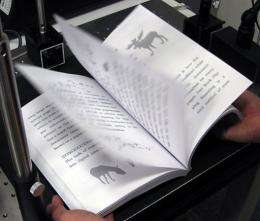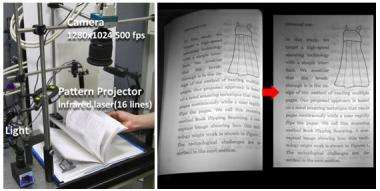Japan rapid scanning system can digitise book in one minute (w/ Video)

Japanese researchers said Friday they had developed technology to scan a book as fast as a person can flip through it.
A prototype ultra-speed scanner capable of digitising a book in one minute will be built within two years, said the chief researcher of the team at the University of Tokyo's Graduate School of Information Science and Technology.
The "book-flipping scanning" system works with a camera that can take up to 500 photographs per second, enabling it to record about 170 book pages in 60 seconds as a person thumbs through them.
The system adjusts for the distortion caused by the curvature of the moving pages by measuring their three-dimensional forms using infra-red beams, so that the images can be electronically "flattened" to look like the original.
"We believe this is the world's fastest (scanning) system as far as the technologies already published are concerned," said Yoshihiro Watanabe, who leads the research team.

"We are considering using robots to turn the pages automatically and more neatly," he told AFP by telephone.
The university researchers teamed up with Japan's Dai Nippon Printing this month to put the technology to practical use, with the aim of building a prototype scanner within two years.
Japanese printing firms are diversifying into e-books, which can be read using handheld devices such as Apple's iPad tablet computer or Amazon's Kindle.
Watanabe said the technology to rapidly capture 3-D images of fast-moving objects could be used in a variety of applications from robotics to industrial and automotive design.
The technology could be used for quality control of industrial products, he said. "You would just scan products that come out of manufacturing lines," he added.
"It could also be used to develop a safer and more comfortable driving system. If mounted on a car, this could take 3-D images of obstacles ahead or dents and bumps in the road to avoid them.
"If loaded into the eyes of robots, they would be able to move much faster than humans."
More information: See PhysOrg's earlier report: Scanner scans a 200 page book in one minute
(c) 2010 AFP




















